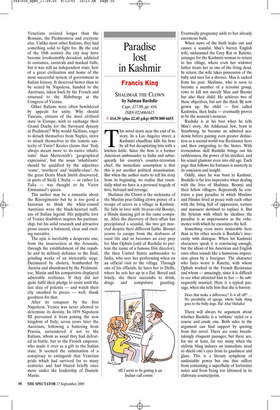Paradise lost in Kashmir
Francis King
SHALIMAR THE CLOWN by Salman Rushdie Cape, £17.99, pp. 416, ISBN 0224061615 ✆ £14.39 (plus £2.45 p&p) 0870 800 6655 This novel starts near the end of its story. In a Los Angeles street, a Kashmiri chauffeur kills his boss by all but decapitating him with a kitchen knife. Since the boss is a former American ambassador to India and subsequently his country’s counter-terrorism chief, the immediate assumption is that this is yet another political assassination. But when the author starts to tell his story from its beginning, we realise that essentially what we have is a personal tragedy of love, betrayal and revenge.
Shalimar the Clown is the nickname of the Muslim prat-falling clown prince of a troupe of actors in a village in Kashmir. He falls in love with 16-year-old Boonyi, a Hindu dancing girl in the same company. After the discovery of their affair has precipitated a scandal, the two get married despite their different faiths. Boonyi yearns to escape from the drabness of rural life and so becomes an easy prey for Max Ophuls (odd of Rushdie to purloin the name of a famous film director), the then United States ambassador to India, who sees her performing when on an official visit to the village. Through one of his officials, he lures her to Delhi, where he sets her up in a flat. Bored and lonely, she there succumbs to drink, drugs and compulsive guzzling. Eventually pregnancy adds to her already enormous bulk.
When news of the birth leaks out and causes a scandal, Max’s barren English wife, nicknamed the Grey Rat or Ratette, arranges for the Kashmiri woman to return to her village, where even her widower father treats her as one of the living dead. In return, the wife takes possession of the baby and sues for a divorce. Max is sacked from his post. Shalimar, who is soon to become a member of a terrorist group, vows to kill not merely Max and Boonyi but also their child. He achieves two of these objectives, but not the third. By now grown up, the child — first called Kashmira, then India — eventually proves to be the assassin’s nemesis.
Rushdie is at his best when he tells Max’s story. An Ashkenazi Jew, born in Strasbourg, he became an admired academic before gaining even greater distinction as a second world war Resistance hero and then emigrating to the States. With tremendous skill Rushdie brings out his ruthlessness, the power of his intellect, and his sexual glamour even into old age. Each page that follows his fortunes is masterly in its concision and insight.
Oddly, since he was born in Kashmir, Rushdie is far less impressive when dealing with the lives of Shalimar, Boonyi and their fellow villagers. Repeatedly he contrasts a past paradise in which Muslims and Hindus lived at peace with each other with the living hell of oppression, torture and massacre destined to replace it. But the lyricism with which he idealises the paradise is as unpersuasive as the vehemence with which he excoriates the hell.
Something even more noticeable here than in his other novels is Rushdie’s insecurity with dialogue. When his Kashmiri characters speak it is convincing enough; but the idiom of his American and English ones often sounds like a humorous impression given by a foreigner. The character who fares worst is Ratette, with whom Ophuls worked in the French Resistance and whom — amazingly, since it is difficult to see what attracted him to her — he subsequently married. Here is a typical passage, when she tells him that she is barren:
Does that make a difference? Is it all off? ... No possibility of sprogs, whole bally thing goes to the bally dogs. Ha! Aha! Hahaha!
There will always be argument about whether Rushdie is a ‘sublime’ stylist or a coarse and crude one. Both sides in the argument can find support by quoting from this novel. There are some breathtakingly eloquent passages; but there are, for me at least, far too many when the stylistic bling induces an immediate need to shield one’s eyes from its gaudiness and glare. This is a literary symphony of undeniable power but one that suffers from containing a superfluity of fortissimo notes and from being too laboured in its elaborate counterpoint.



















































 Previous page
Previous page